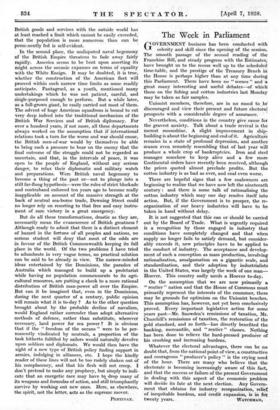The Week in Parliament
GOVERNMENT business has been conducted with celerity and skill since the opening of the session. The smooth passage of the second reading of the Franchise Bill, and steady progress with the Estimates, have brought us to the recess well up to the scheduled, time-table, and the prestige of the Treasury Bench in the House is perhaps higher than at any time during this Parliament. There have been no " scenes " and a great many interesting and useful debates—of which thoSe on the fishing and cotton industries last Monday may be taken as fair samples. - Unionist members, therefore, are in no mood to _be discouraged and view their present and future electOral prospects with a considerable degree of assurance. = Nevertheless, conditions in the country give cause for the gravest anxiety. Talk about a trade revival is the Merest moonshine. A slight improvement in ship: building is about the beginning and end of it. Agriculture remains in a state of profound depression, and another Season even remotely resembling 'that of last year will produce a whole crop of bankruptcies. Iron and steel manages somehow to keep alive and a few more Continental Orders hive recently been received, although the prices quoted almost preclude profits. But the cotton industry is as bad as ever, and coal even worse.
There are hopeful signs that a few coalowners are beginning to realize that we have now left the nineteenth century : and there is some talk of rationalizing the cotton industry which may one day resolve itself into action. But, if the Government is to prosper, the re- organization of our heavy industries will have to be taken in hand without delay.
It is not suggested that this can or should be carried out by the Board of Trade. What is urgently required is a recognition by those engaged in industry that conditions have completely changed and that when supply no longer fails to satisfy demand, but consider- ably exceeds it, new principles have to be applied to the conduct of industry. The acceptance and develop- ment of such a conception as mass production, involving rationalization, amalgamation on a gigantic scale, and standardization, and their adoption by industrialists in the United States, was largely the work of one man— Hoover. This country sadly needs a Hoover to-day.
On the assumption that we are now primarily a " rentier " nation and that the House of Commons must primarily represent the interests of the consumer, there may be grounds for optimism on the Unionist benches. This assumption has, however, not yet been conclusively proved. Every important legislative action for some years past—Mr. Snowden's remissions of taxation, Mr. Churchill's remissions of taxation, the restoration of the gold standard, and so forth—has directly benefited the banking, mercantile, and " rentier " classes. Nothing has been done to relieve the hard-pressed produc'er of his crushing and increasing burdens.
Whatever the electoral advantages, there can be no doubt that, from the national point of view, a constructive and courageous " producer's policy " is the crying need of the hour. There are many who believe that the electorate is becoming increasingly aware of this fact, and that the success or failure of the present Government in dealing with this aspect of the economic problem will decide its fate at the next election. Any Govern- ment that obtains for industry reorganization, relieg of inequitable burdens, and credit expansion, is in for






































 Previous page
Previous page